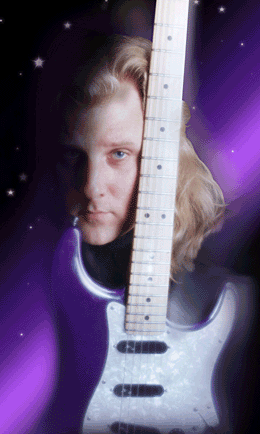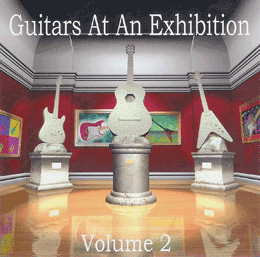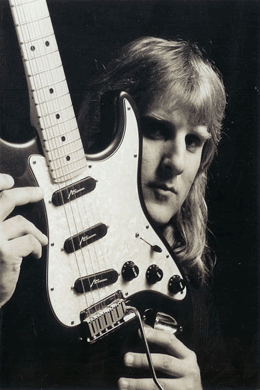From GIG, LLC archives, we are rebuilding our interview section to offer our readers our full array of guitarist interviews from our past Modern Guitars magazine files and early GI files. Please, enjoy this 2009 interview with guitarist, Eric Mantel.
 Guitarist Eric Mantel’s music roots lie in the sounds of the ‘60s and ‘70s. His songwriting talents have been compared to Todd Rundgren, Sting, Greg Lake and the Beatles and when he grabs his axe, he weaves jazz, pop, rock, country, R&B, funk, ragtime, classical and other styles into finely crafted melodic tapestries.
Guitarist Eric Mantel’s music roots lie in the sounds of the ‘60s and ‘70s. His songwriting talents have been compared to Todd Rundgren, Sting, Greg Lake and the Beatles and when he grabs his axe, he weaves jazz, pop, rock, country, R&B, funk, ragtime, classical and other styles into finely crafted melodic tapestries.
In 1982, at the age of 19, Mantel released his first independent solo album Montage.
“Exceptional!” – George Bellas
“…a great guitarist” – Michael Angelo Batio
“…clever guitarist’s scorching riffs!” – Chicago Music Magazine
“…one of Chicago’s best kept secrets and a guitar virtuoso.” – Street Rock Magazine
“I think Eric Mantel is a guitar player of definite quality with something significant to say in his songwriting, it was a pleasure to have him on the Guitars at an Exhibition Volumes 1 & 2 compilation CDs!” – Tom Hess (Holyhell)
During the ‘80s, Eric performed with rock bands, established a recording studio, cut a music video and established Holistic Music Entertainment – named because he believes that music has the power to heal and awaken the spirit. Mantel also found time to teach over 3,500 students how to navigate fretboards.
Eric Mantel has been spotlighted in Guitar Player magazine, featured in Guitar World magazine, lauded in Chicago’s Local Live magazine, the Illinois Entertainer, CAMM Street Rock, the Midwest Beat and other music publications.
In 1990, Eric and his new group, The Eric Mantel Trio, issued The Politics of Experience that received rave reviews from local and national critics. He then released an acoustic set on his CD A Time to Remember. His latest CD, 2006’s Unstruck Melody , captures listeners with music that is both technically and artistically complete.
 When did you first realize that you’d pursue music as a career?
When did you first realize that you’d pursue music as a career?
Eric Mantel: In 1976 I played my first real gig at my Junior H.S. It was in front of 800 people. I knew then that this was my destiny.
What were your musical goals when you first started?
EM: To learn every Beatle song that there was and later to become a very diverse guitar player.
Did your wide set of influences contribute to the diversity of your style?
EM: Yes it definitely helped create my own style which is basically an amalgamation of all my musical influences.
Have you ever been compared to anyone?
EM: I’ve been compared to Eric Johnson for many many years now and at first it really bothered me because I didn’t want to live in his shadow but now I take it as a compliment. I mean how many people on the planet can play like Eric Johnson?
The truth is, Eric is one in many influences in my playing style. He and I also happen to have the same exact musical influences. We are cut from the same piece of cloth so to speak. Someone once told me that Eric and I have the same antennae; we both hear the same things. I guess we are channeling from the same musical muse. It’s part coincidence, part influence. I already had the same exact musical vision that he had before I even knew who he was. I put out my first LP in 1982 which was 4 years before Tones came out. Eric didn’t become an influence until 1986.
He was my last big influence on the guitar. I’ve had the honor of meeting him several times and have corresponded with him for many years. As far as other influences go: The Beatles, Allan Holdsworth, Steve Morse, Steve Howe, Chet Atkins, Lenny Breau, John McLaughlin, violinists Sean Luc Ponty and Jerry Goodman, Eric Clapton, Jeff Beck, Jimi Hendrix, John Coltrane, and about another hundred plus guitar players.
The bottom line is, no one is 100% original; we all borrow from each other and add our own little twist. No matter how strong an influence is in your playing, your own personality will always shine through because we are all unique spiritual beings.
How has your style and taste in music evolved over time?
 EM: Back in the early ’70s I was strictly into classic rock, blues and some progressive music like Yes, ELP, Moody Blues, King Crimson, and the blues of B.B. King, Muddy Waters, Johnny Winter, and others. I was into Led Zeppelin, The Who, Jeff Beck, Jimi Hendrix, The Beatles, The Rolling Stones, and Eric Clapton. The list goes on and on and on. In the mid to late ’70s I got into Peter Frampton, Al Dimeola, John McLaughlin, Bill Conners, Allan Holdsworth, and Steve Morse of the Dixie Dregs.
EM: Back in the early ’70s I was strictly into classic rock, blues and some progressive music like Yes, ELP, Moody Blues, King Crimson, and the blues of B.B. King, Muddy Waters, Johnny Winter, and others. I was into Led Zeppelin, The Who, Jeff Beck, Jimi Hendrix, The Beatles, The Rolling Stones, and Eric Clapton. The list goes on and on and on. In the mid to late ’70s I got into Peter Frampton, Al Dimeola, John McLaughlin, Bill Conners, Allan Holdsworth, and Steve Morse of the Dixie Dregs.
I also got into jazz and classical music – Joe Pass, Wes Montgomery, Andres Segovia, Christopher Parkening and others. I have so many influences that I cannot begin to count them all. I was a musical sponge for a good fifteen solid years. I was listening to it all and learning it all.
How did your family react and support your aspirations?
EM: My whole entire family consists of artists, musicians and actors so they have always been supportive. My musical roots are in rock ‘n’ roll, the Beatles, ’60s and ’70s music.
Tell us about your guitar clinics. What do you like to demonstrate and perform during these?
EM: At my guitar clinics I stress the importance of being diverse on the guitar and not being a one trick pony. I also stress the importance of being melodic and having good tone.
Tell us about your guitar instruction service and how you approach teaching beginning students.
EM: My teaching service is basically a boot camp for guitar players. I am very aggressive and I challenge all of my students. Students learn at a very fast rate. Go to my web site, it explains this in great detail.
What guitars are on your favorites list?
EM: I own a lot of guitars. Mainly Fender and Gibsons. I also have some Taylor, Guild, Washburn, Gretsch, Rickenbacker, and other guitars. My favorite guitar? I don’t have one.
What went into creating your new album, The Unstruck Melody?
EM: A lot of time and energy went in to that album and that’s all that I can say.
 What styles of music had the most impact on it?
What styles of music had the most impact on it?
EM: All styles of music have greatly influenced me. It was Steve Howe that made me realize that you can do it all on the guitar. He’s my biggest influence, more so than Eric Johnson. Todd Rundgren is another huge influence on me. Todd is God.
How was the process of building your new recording studio? What kind of gear did you use to capture your sound?
EM: My CD was recorded at Pat Doody’s recording studio: Drumhead Recording Studios in Tinley Park, Iliinois. My home studio came later. I used a Shure SM7 mic and some SE electronic microphones. I used a ’67 Fender Twin Reverb and many guitars. Effects included a Rocktron Banshee Talk Box, Fulltone TTE, Fulltone Distortion Pro, and many others.
How do you balance the time between the lessons, clinics, performances, recording, practice and other necessary responsibilities?
EM: I am a huge multi-tasking freak. I should write a book on multi-tasking.. The secret is to be very organized, especially with your time. Time management is everything. Setting goals is also very important.
How frequently and to what extent do you still practice and learn?
EM: I try to put in one to two hours a day. Sometimes I have no time to practice. I am mainly working on my country style of playing and some jazz stuff. I’ve also been transcribing saxophone, piano and violin solos onto the guitar.
Tell us about your formal music education.
EM: I spent many years with private instructors in all styles of music including classical, jazz, ragtime, country, the blues, and others. I attended Prairie State College for music theory and studied violin there as well as piano. I’ve been playing piano since the age of ten.
What goes into the creation of a new song?
EM: I work totally from inspiration. I never try to force anything out. If I am going to write a vocal tune I pretty much know that ahead of time. I try to tap into the music that’s already inside of me.
What tends to be your main inspiration lyrically and poetically?
EM: I like to write about political and spiritual stuff. I try to avoid writing boy meets girl songs. I try to write about all subject matters.
What kind of difficulties and setbacks have you experienced in the music industry and how have you overcome them?
EM: The only set backs that I have encountered is dealing with people who lie and make promises that cannot be delivered. What I’ve learned is to do it all yourself and trust no one. This music business is so corrupt and greedy that it’s beyond words. Rely on no one and be totally self contained. If you have the energy, the time and don’t mind doing some leg work, then do it all yourself. Surround yourself with positive people.
What’s currently in your iPod?
EM: I have to say that I really like John Mayer’s songwriting style. I still listen to Todd Rundgren and the Beatles. I’ve been listening to John Coltrane, Oscar Peterson, Lester Young and many other great jazz musicians.
Where do you see your music career going? What goals and dreams do you have?
EM: To finally be discovered on a global scale which is finally happening for me right now. To sell ten million records and retire early. [Laughs] I’ve been doing this now for over thirty years – I’m a dinosaur. I want to continue to put albums out and write eclectic music that touches people.
Related Link
Eric Mantel
Interview With Guitarist and Songwriter Eric Mantel | Baazar Productions (11 years ago)
[…] Interview With Guitarist and Songwriter Eric Mantel Originally posted in Modern Guitars magazine. Now GuitarInternational.com […]